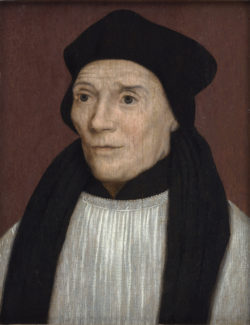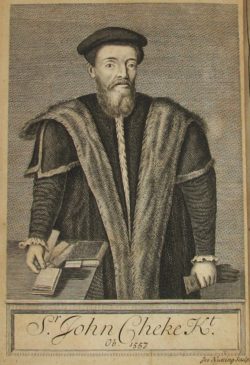The First Professors
Since, in medieval times, the term ‘professor’ seems gradually to have evolved from other titles or labels, such as ‘lecturer’, ‘reader’ or ‘magister’, it is difficult to identify some of the earliest professors because they may have started off being referred to by these other titles. However, we do have information on some of the incumbents of the professorships endowed during the late medieval period, and many universities provide information on their websites on some of their most notable early professors.
Some notable early professors

John Fisher, by Hans Holbein the younger
The first holder of the Lady Margaret professorship of Divinity at Cambridge was John Fisher, bishop of Rochester. He happened to be Lady Margaret’s confessor, and evidently established a close working relationship with her, and was instrumental in persuading her to finance much of Cambridge University’s development; Lady Margaret’s crest, the Beaufort portcullis, appears above the entrance to St John’s College Cambridge, of which she was a great patron. (Fisher’s having been his grandmother’s confessor evidently cut no ice with King Henry VIII. In the fallout of the English reformation, the bishop was beheaded for treason in 1535, having refused to take an oath of succession that acknowledged the issue of Henry and Queen Anne Boleyn as legitimate heirs to the throne of England.)
It is apparently through the accounts kept at the time that historians have been able to identify who, within the Tudor period, was in receipt of professorial stipends, and therefore who were some of the earliest scholars known as professors or as lecturers and readers that were the precursors to what evolved into professorships. A receipt discovered relatively recently in Westminster Abbey (which administered the Lady Margaret professors’ stipends), Collinson and co-authors (2003) tell us, suggests that a Dr Humphrey Walkden (or Walden) held the Cambridge professorship during the early 16th century, and that ‘In the academic year 1519-20, he petitioned for a dispensation from some of his obligations on the grounds that the University had asked him to lecture on Book IV of Dun’s Scotus in the Long Vacation, over and above his lectures in college. Adding in his preaching obligations for his own and another college, he sought some relief from burdens which, he claimed, were too much for one man’. Evidently sixteenth century professors were as overworked as are 21st century ones!
William Buckmaster, a fellow of Peterhouse College, Cambridge, became Lady Margaret professor of divinity in 1532, during the reign of King Henry VIII, and long after the death of Margaret Beaufort herself in 1509.
The first king’s reader (which was to evolve into the regius professorship in 1540) in divinity at Cambridge was Alexander Alesius. Collinson and co-authors (2003) tell us that Alesius was a Scottish Lutheran who was a good friend of Thomas Cromwell (who, for a period, as Henry VIII’s right-hand man was the most powerful man in England). Scotland was at that time a separate country and Alesius seems to have been a refugee whose lectures at Cambridge ‘aroused considerable hostility’, not only because there were many who, despite Henry VIII’s break from it, still remained loyal to Rome, and Alesius’s lectures smacked of the evangelism that was a feature of the English Reformation, but also because Alesius was Scottish: ‘In Tudor England, calling someone a Scot was prima facie grounds for action for slander’ (Collinson et al., 2003).

Engraving of Sir John Cheke, by Joseph Nutting, from the Life of Sir John Cheke by John Strype.
John Cheke – identified as one of Tudor England’s greatest scholars – was evidently an early distinguished professor. He was appointed to the first regius professorship of Greek in 1540, the year it was established by Henry VIII. Collinson and co-authors (2003) refer to him as ‘an assiduous lecturer’, but add that he then relinquished his chair in around 1544 to become tutor to Henry VIII’s son, Prince Edward (who was to accede to the throne at the age of nine as King Edward VI in 1547). From 1548 to 1550 the accounts show that Cheke was in receipt of the stipend for (and therefore the incumbent of) the Lady Margaret professorship in divinity at Cambridge. Notably, he was the first lay person to hold the Lady Margaret professorship.
In Scotland, notable early professors include Robert Rollock, who lived from 1555 to 1599. He graduated from St Andrews University in 1577, where he was kept on as regent in philosophy. He acquired a national reputation for the quality of his teaching, as well as the piety that he encouraged in his students. In November 1587 Rollock was appointed professor of theology, in which capacity he offered instruction in divinity to graduates who wanted to enter the ministry. That same year he had also become the first principal of the University of Edinburgh, and the two posts – principal and professor of theology – remained linked until 1620. On the University of Edinburgh website Robert Rollock is described: ‘Rollock saw himself not only as an educator but as a spiritual guide to his students, keeping a close eye on their personal religion. As Principal, he conducted “family worship” with the students every evening, instructed them in the knowledge of God and their religious duties, every Wednesday, and on Sunday accompanied all the students to St Giles’ Cathedral for the morning and afternoon sermons’ (http://ourhistory.is.ed.ac.uk/index.php/Robert_Rollock_(1555-1599) )
Henry Charteris had been taught by Robert Rollock when the University of Edinburgh had opened in 1583. He returned to the university as regent in 1589, and, on Rollock’s deathbed recommendation, was appointed to the dual role of principal and professor of divinity in 1599. When Charteris resigned from this post in 1620 to become minister of North Leith, the dual post was separated into two because the new principal of Edinburgh University was a layman, and therefore ineligible for appointment to the professorship. The chair in theology went to Andrew Ramsay, but when Ramsay resigned in 1626 Henry Charteris was invited to resume the professorship, which he held until his death in 1629.
The University of Edinburgh website presents the following contemporary account of Charteris:
When he visited Scotland in 1617, James VI and I summoned the professors of Edinburgh University to Stirling to hold a disputation before him. Charteris's great personal modesty led him to decline to take part. At the end of the disputation, the King made a number of learned puns on the names of the professors. According to Craufurd, he said of Charteris: 'His name agreeth very well unto his nature, for charters contain much matter yet say nothing, but put great purposes in men's mouths'. Craufurd himself remarked that Charteris was 'certainly one of the most learned men of his time, both in tongues, and in philosophy and divinity, but he had too low thoughts of himself'.
[http://ourhistory.is.ed.ac.uk]
Charteris had married three times and fathered twenty-three children. One of his sons, Laurence Charteris, went on to become professor of divinity at Edinburgh University from 1675 to 1682 (it was not uncommon in this period of Scottish university history for sons to succeed to their fathers’ professorships). Laurence Charteris resigned from his chair in protest at being required to swear the test oath, which would have meant that he acknowledged the Roman Catholic James, Duke of Albany (who went on to become King James VII of Scotland and James II of England) as head of the Church of Scotland.
